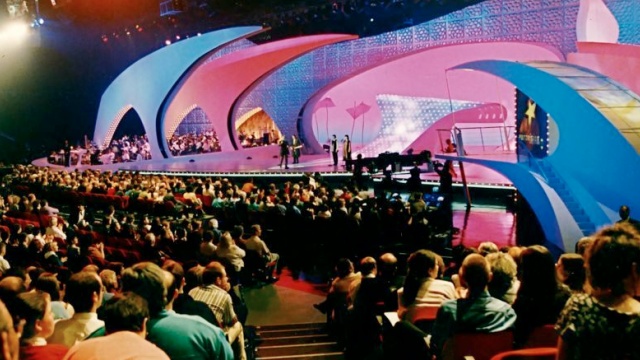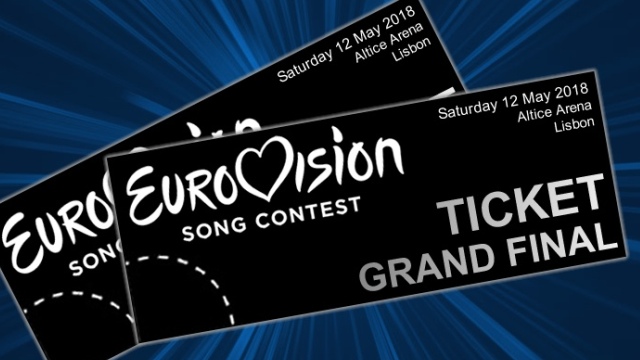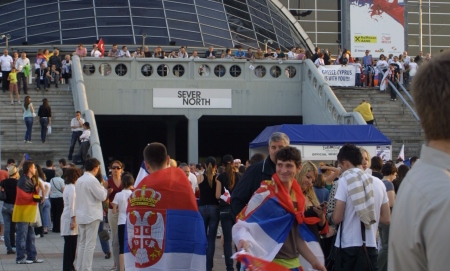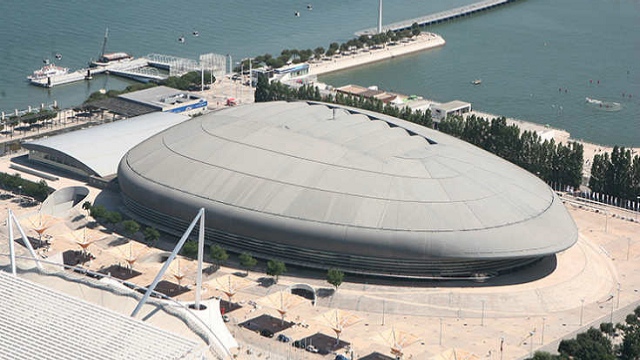For the vast majority of fans of the Eurovision Song Contest, the show is the televisual highlight of the year. For others it is a social event that requires planning, commitment, a sense of adventure, and the ability find tickets to be in the audience of the live shows. With the 2018 Song Contest arriving in a very desirable and easily reachable location, demand for tickets has been higher than normal, which has cast a light into the dark corners of scalpers, bots, and the secondary ticketing industry.
Why has it been harder than normal to get a ticket for the Lisbon shows, how can the EBU ensure more fans and less professionals receive tickets, and what methods are used by other high-profile events to achieve this?

A year without bots, the audience are ready for the Eurovision Song Contest 1998 (image: Eurovision.tv)
What Everyone Can See Happening
Within moments of tickets to the Eurovision Song Contest going on sale, they appear on secondary ticket selling sites such as Viagogo, Seatwave, and Getmein. The prices are inflated well above the listed price, fans who have followed the Song Contest through the year feel cheated, and there’s a sense that making money beats love of the Contest.
It’s not as simple as ‘the bots buy all the tickets and then sell them at a ridiculous mark-up,’ but it is close. Acting as a scalper for big events is a full-time profession with huge riches for those ticket brokers who make it. It is a constant battlefield for ticket sellers to allow genuine consumers to buy tickets while keeping out the secondary elements.
For the brokers this is their livelihood. Their job is to understand the websites and systems better than those who make them. Their profit can be found by shaving milliseconds off the transaction time through faster drop downs and text inputs. The average concert goer makes a handful of transactions a year. Brokers can make thousands a day.
If there’s an advantage, they have found it. And when they can’t find an advantage in the system, they will make one.

Eurovision 2018 Photoshopped Tickets (via Eurovision World)
Take the usefulness of using a prepaid credit cards. Typically used by travellers worried about handing over details to their own bank accounts, or by consumers who need a card but have low credit ratings, ticket brokers have another use for them.
Many events now ask for the credit card used to purchase a ticket to be presented at the venue alongside the ticket. It is possible to ‘orders’ a ticket through an agency for a big event ahead of the box office opening. The vast digital infrastructure of bots and buyers used to capture as many tickets as possible now has a specific target concert and a specific buyer. The ticket is purchased by the prepaid credit card, and when the secondary sale is made the buyer will receive not just the ticket but also the credit card used to buy the ticket.
Anyone using this approach to obtain a ticket will realise they are trying to game the system of ID checks, so it’s unlikely to be offered on the open market, but it is an option for those who have a relationship with a broker.

Attending Eurovision 2008
Then there’s the ultimate ‘confidence’ move, where secondary sellers list a ticket without yet actually having the ticket to sell. In this scenario a ticket is listed on the secondary sites at a very high price, with delivery promised a few days to a week before the concert. Once the ticket is ‘purchased’ the vendor now has time (and budget) to go out and source a ticket to supply to the wide-eyed consumer who thinks their ‘show of a lifetime’ is guaranteed.
The Eurovision Song Contest is no different to any other event… a small number of seats and a much larger fan base to exploit means there is easy profit for the shady end of the market.
We Do This Every Year, Why Have Tickets Not Changed?
This is a situation that happens ahead of every Eurovision, so the obvious place to start is to ask why the Song Contest is susceptible to this.
I think this is down to the small amount of time that a host broadcaster has to organise the event. There is a huge emphasis on the size of the arena, transport links in the host city, hotel beds available, the amount of electrical power required, and other details around the show. Ticketing for the live shows has to come after many logistical elements are decided; even then the feeling is that the goal of the host broadcaster is ‘pack in as many people as possible, as quickly as possible, while spending as few resources as possible.’
The EBU is not in a position to build and provide its own ticketing system to the Eurovision family of events. While it can provide many services for its members, offering a bespoke ticketing system is not a cost effective way forward. In the same way that the EBU and the host broadcaster each year will tender for services from building the lighting rig above the stage to supplying coffee to the press room, ticketing for the Song Contest events also comes under the tender process.
That means that even though there is the potential for a different broadcaster each year to be involved in the process, and a different company each year that will be handling the process, the EBU can insist on certain conditions and base-line expectations to be implemented.
The live experience of the Eurovision Song Contest should be more than ‘just get the stadium filled with the lowest expense spent on selling the tickets’. It’s time for the process to receive the same attention to detail as the televised product receives.

Lisbon 2018’s Atlantic Arena from the sky.
Three Ticketing Suggestions For Distribution, Denial, And Demand
Arguably, the reason that there is so much demand for tickets (and an apparently vibrant secondary ticketing market) is that the tickets are still too cheap. In a perfectly capitalistic world you would keep lifting the price of the tickets until you reached a point where all the tickets sold out and nobody who could afford a ticket was still wanting for one.
This would have the knock on effect of offering the Song Contest much more funds for the show’s budget.
Of course we don’t live in that sort of world – the EBU wants the Contest to be accessible to as wide an audience as possible. That means creating a scheme where everyone has a chance of obtaining a ticket, and the impact of the secondary ticketing market is reduced.
Thankfully the live music an theatre/concert world has been addressing these problems for some time, and it is far better to look at practical changes that have already been made to understand what the Song Contest’s ticketing tender could target in the future.
The Credit Card Of The Beast
One of the leading campaigners against secondary ticket sales is the rock band Iron Maiden. The last few tours organised by the band have seen the number of tickets resold dropping by more than ninety-five percent. In 2010, the day after tickets for the band’s 2011 tour went on sale almost 7000 tickets were listed on secondary ticketing platforms. In 2016 that number had dropped to 207.
The bands management acknowledge that fans have to jump through one extra hoop to achieve this – they do not get issued the ticket until they arrive at the concert. When they do, they must have the original credit or debit card with them along with photo ID. Their name is verified, payment is checked, the ticket is issued, and then validated as they enter the venue.
A similar system is in place at the Victoria Theatre in London for ‘Hamilton’ tickets. Your ID and card needs to match that submitted at the time of booking, and any exceptions must be discussed well in advance with (in this case) Ticketmaster.
Hamlet: The Mild Ballot Solution
Take Tom Hiddleston’s recent appearance in Hamlet at the Jerwood Vanbrugh Theatre. With just 160 seats each performance, this was going to be a very exclusive and sought after ticket. How to create a fair and equitable distribution of the small number of seats compared to the demand was the issue faced by RADA.
It’s choice was to move to a full ballot system. Everyone who wanted a ticket submitted their name, and an online ballot wold pick names at random and offer them a specific time-slot to buy one or two ticket. The registration period was open over six days, and included a name verification step. Either the ticket buyer or a named individual (who was named at the point of purchase) had to attend the show, reducing the ability to re-sell the tickets.
RADA also worked with its ticketing partners to make a dedicated ticketing website that was designed around the ballot method to ensure a simple user experience.
The Swinging Swifties
Hiddleston’s Hamlet was very much a one-off, but Eurovision not only happens every year, but has an engaged fan base that is active all year round. I personally think that mixing the principle of a ballot, along with the ‘ID at the door’ requirements are solid ideas that should feature as part of the ticketing process of the Eurovision Song Contest.
But it is worth noting the logical extreme that this could be taken to. Tickets to ‘golden’ sections of the Semi Finals and Grand Finals could be regarded as rewards and thank yous to engaged fans who help promote Eurovision throughout the year. In a sense this already happens with the OGAE ticket packages, but I’m talking about supercharging this idea, bypassing OGAE, and going for the full Tay Tay.
Before tickets went on public sale for Taylor Swift’s ‘Reputation’ Concert, some fans were invited to register into a pre-sale process. Once registered, you could boost your place in the virtual queue for the allocated one-hour windows to buy your tickets. Boosting activities included sharing news and links on social media, watching Taylor Swift videos and listening to tracks on streaming music services, purchasing the album through the website, and buying Taylor Swift merchandise.
If only there was some sort of house where fans could buy Eurovision merchandise and could “…connect and integrate the global Eurovision fan base with the Eurovision Song Contest, on a year-round basis.”
A Little Difference Goes A Long Way
There will be an audience for all of the live shows of this year’s Eurovision Song Contest, so in a broad sense the system that is in place now is one that works. Yet the system does not feel fair and equitable towards those who follow the Contest all year round.
It is within the remit of the EBU to request specific conditions in the tender process for ticketing, and there are methods that can be used that have proven successful with other major productions around the world. Tweaking the ticketing system for 2019 and beyond will lead to a slight increase in complexity for fans and the host broadcaster, but this marginal win would deliver a far better emotional experience to the Eurovision Song Contest.










One of my long wishes is to attend the contest once in my life.
With the current ticket prices and the fact that tickets are sold out, within a fraction of a minute, I have no chance in achieving this goal.
Any change in the system that give a chance to anyone in a similar situation will be welcomed
Maybe Eurovision can adopt the system used by UEFA and FIFA…uh, wait…
A nice article Ewan. Everything about your article suggests that the best way of ensuring a venue filled and higher prices (if necessary) to generate more income for the show, broadcasters etc is to drastically increase the number of tickets sold to the true fans at various OGAEs. I am confident that many of us true, longstanding fans would pay more (or a lot more) to get a lock on tickets.